- Home
- Peter Ackroyd
Revolution, a History of England, Volume 4 Page 8
Revolution, a History of England, Volume 4 Read online
Page 8
The Spectator had disavowed any partisan affiliations, with Addison declaring that ‘my paper has not in it a single word of news, a reflection in politics nor a stroke of party’. His purpose was to teach manners and not measures, and he added that ‘I shall be ambitious to have it said of me that I have brought philosophy out of closets and libraries, schools and colleges, to dwell in clubs and assemblies, at tea-tables and in coffee houses.’
This represents the refining tendency of the eighteenth century. The Spectator would civilize the Jacobites, the enthusiasts, the high church Tories and the ferocious partisans, out of existence. The great medium of truth would be sociable discourse and, of all the humours in the casebook of Hippocrates, only good sense would remain. The moral did not need to be emblazoned on the masthead of the periodical since it represented the temperate and tolerant society, the virtuous commonwealth, that was considered to be the proper and appropriate consequence of the revolution of 1688.
Of course the absence of enthusiasm, and the decline in earnestness of all kinds, might in turn arouse cynicism and fatalism. The plays of Congreve, written just before the accession of Queen Anne, are populated by characters who are naturally and instinctively deceitful; the world is a great theatre of folly, in which truth and virtue are nowhere to be found. It is a sphere of wit and foolery, animated only by sexual greed and the pursuit of money; the men lie, wheedle and betray; the women are lustful, silly and untrustworthy. The plays of Richard Brinsley Sheridan, at a slightly later date, are preoccupied with hypocrisy and fraudulence in the service of money; metaphors of banking and finance, so central to the period, hold together the dramatic narratives in bands of gold. Sheridan had nothing but contempt for the vogue of sentiment that came to be so fashionable in the mid-eighteenth century, regarded by many as a trite and naïve refusal to countenance the real truths of the age. ‘If you have any regard for me,’ Sir Peter Teazle says in The School for Scandal (1777), ‘never let me hear you utter anything like a sentiment.’
We also have two more voices, from Congreve’s The Double Dealer (1693), to add to the cacophony of the period after the Glorious Revolution.
Brisk: I have a violent passion for your ladyship, seriously.
Lady Froth: Seriously? Ha ha ha!
Brisk: Seriously, ha ha ha. Gad I have, for all I laugh.
Lady Froth: Ha ha ha! What d’ye think I laugh at? Ha ha ha.
6
Waiting for the day
The desire now was for peace. After ten years of war against the French the nation was weary. The new Tory government, elected overwhelmingly in the autumn of 1710, was all too willing to bow to the public demand. When the new parliament assembled, and the duke of Marlborough had taken his accustomed seat in the House of Lords, the queen commenced her speech by announcing: ‘I am glad that I can now tell you that notwithstanding the arts of those who delight in war, both place and time are appointed for opening the treaty of a general peace.’ This was a Tory kick against the previous Whig administration but in the subsequent debate Marlborough took exception to the insinuation that he had prolonged the war artificially for reasons of private convenience or profit. When he made his appearance at court in the last week of the year Swift noted in a letter to his close friend, Esther Johnson, that ‘nobody hardly took notice of him’.
The duke’s principal political opponent had meanwhile become the hero of the hour when, in the spring of 1711, he had been the victim of an unsuccessful assassination by a French spy. Robert Harley had been stabbed twice in the chest but an elaborately ornate and padded waistcoat saved him from serious injury. His wonderful escape was a cause of much triumphalism, and in honour of his safe recovery the queen ennobled him as the earl of Oxford and earl Mortimer as well as promoting him to be lord high treasurer. In this superior capacity he lost no time in prosecuting his opponents still further and, the evening after the queen had denounced ‘those who delight in war’, he instigated proceedings against Marlborough for bribery and corruption.
The terms for a peace between France and England, so long looked for, were already being discussed in the course of secret negotiations at the beginning of 1711. The principal tenet, if it can be so called, was that the two countries would enter a secret understanding even at the expense of their allies. A Franco-British treaty would be enough to cow them into agreement. The second article would allow Philip V to remain on the throne of Spain in exchange for certain commercial concessions to the British in Europe and on the American continent. There was even some discussion of the ‘Old Pretender’ returning to England if he espoused the cause of Anglicanism but, in the unlikely event of James Edward becoming an apostate, it remained mere talk. It is a measure, however, of the crucial significance that the Stuart succession still held in English politics.
In November 1711 Jonathan Swift issued one of his most incendiary and effective pamphlets, ‘The Conduct of the Allies’, in which he declared that ‘no reasonable man . . . can be of the opinion for continuing the war’. He accused the Whig oligarchs of placing ‘a sort of artificial wealth of funds and stocks in the hands of those who for ten years before had been plundering the public’; he believed that ‘we are thus become the dupes and bubbles of Europe’. He accused Marlborough of ‘that unmeasurable love of wealth, which his best friends allow to be his predominant passion’. Towards the conclusion of his polemic he states that ‘we have been fighting for the ruin of the public interest, and the advancement of a private. We have been fighting to raise the wealth and grandeur of a particular family; to enrich usurers and stock-jobbers; and to cultivate the pernicious designs of a faction, by destroying the landed interest.’ It was a comprehensive catalogue of ills.
In the following month the duke of Marlborough was dismissed by the queen from all offices of state. His carriage was chased by angry members of the populace, crying out ‘Stop thief!’ The victor of Blenheim, and the saviour of Europe from Louis, had good reason to contemplate the turning of Fortune’s wheel. ‘Ah,’ Boethius had written in The Consolation of Philosophy, ‘dull-witted mortal. If Fortune begin to stay still, she is no longer Fortune.’ Marlborough and his wife soon decamped to the continent where they hoped to find more enduring allies. Many of the Whig lords were still supporting the duke, and the further prosecution of the war, but Queen Anne managed to dilute their partisanship by creating twelve new peers on the first day of 1712. Now the House of Lords was in agreement with the Commons.
Sarah, duchess of Marlborough, had already fallen far out of favour. She was an earnest and argumentative Whig who had eventually exasperated and alienated the queen. Her supplanter in the position of royal confidante was Abigail Masham, who became ‘keeper of the queen’s purse’; Masham was also cousin to Robert Harley and was believed to have maintained the interests of that sinuous survivor. There were further rumours of over-familiarity between Masham and the queen, with what a ballad called ‘some dark deeds at night’ between the elderly sovereign and her servant. The queen’s gout and general ill-health would not have encouraged physical passion, but she may have needed familiar female companionship to withstand the ills of a predominantly male world. The more extreme sexual gossip seems on the face of it unfounded, therefore, but it was still assiduously promoted by the duchess of Marlborough in revenge for her usurpation.
When the eventual peace conference between France and England opened in Utrecht at the end of January 1712, much had already been agreed in clandestine negotiations. When the treaty was eventually signed in the spring of 1713, it had become clear that Great Britain was a world power fit to challenge France, and that in addition it was now the dominant naval power with bases at Gibraltar and Minorca in the Mediterranean. The British took firmer control of North America, with the possession of Newfoundland and Hudson’s Bay. And they had been granted the additional bonus of the asiento, a treaty that allowed English vessels to ship African slaves to the Spanish colonies of the Americas. The cup of maritime supremacy flowed over, and the
articles signed at Utrecht were able to keep the peace between France and England for the next fifteen years.
The rejoicing was by no means universal. The war had continued during the course of the negotiations, and the duke of Ormonde had been sent out to replace Marlborough in command of the English forces. But it was not intended that he should compromise any quiet diplomacy with rough action; he was sent what was called a ‘restraining order’ that prevented him from taking part in any battle or participating in any siege. All was to be quiet on the various fronts. It did not take long for the allies to become acquainted with the position of their erstwhile colleagues who had suddenly become non-combatants; they reacted as much with disbelief as with fury. They had effectively been deserted on the field of battle.
One of those allies was George, prince-elector of Hanover, who like the other princes and commanders felt that he had been betrayed by the Tory administration desperate for peace. His interests had been sold behind his back. It was clear enough that England would get rid of her supposed friends as soon as they were unnecessary to her. So grew the myth of ‘perfidious Albion’. Unhappily for the Tories, however, George, heir to the house of Hanover, was more than likely to become the next king of England. How were Harley and others to shield themselves from his wrath?
In the last year of the queen’s reign, party loyalties, therefore, were screwed to the highest pitch. To vote with the Tories for peace was tantamount to disowning the coming prince. To vote with the Whigs for war was to ignore the fervent wishes of the nation. The volatile state of the nation’s politics was compounded by the problem of the ‘Old Pretender’. It was widely assumed that the queen secretly favoured her half-brother, James Francis Edward Stuart, in the place of the Hanoverians; this may have been true of some of her ministers, but there is no reason to believe that she harboured any such desire. She was fervently Protestant, and could not in conscience have endured the return of a committed Catholic. Since James soon publicly refused to renounce the old faith, the possibility of his succeeding Anne became ever more remote.
Some ministers and councillors still faced both ways, sending messages of assurance to the Stuart court while continuing to deal with the house of Hanover. The duke of Marlborough, now on enforced leave on the continent, was actively preparing his committed forces at Bruges, Ghent and elsewhere for action on behalf of the house of Hanover if it were threatened; yet at the same time he was maintaining contact with the Pretender. This vertiginous ambiguity, performed on a tightrope between two eminences, is an extreme form of the ambivalence felt by the nation between the candidates for the throne.
It is difficult to know, amongst all the bitterness and controversy, where the balance lay. It was said that the first claimant who arrived in England after the death of the queen, James or George, would be welcomed as sovereign. This was silly. The matter of succession had become a poisoned well of suspicion, rumour and intrigue. In a pamphlet of 1713, ‘Reasons against the Succession of the House of Hanover’, Daniel Defoe records that ‘the poor despicable scullions learn to cry “High Church; no Dutch kings; no Hanover!” that they may do it dexterously when they come into the next mob’ while their Whig antagonists ‘clamour “No French peace, no Pretender, no Popery!”’ In the spring of the following year Richard Steele wrote that ‘according to the situation of affairs, nothing but divine providence can prevent a civil war within a few years’. These were the gloomy prognostications of those who understood public affairs best. The age of Anne was not an age of stability.
The Tories themselves were at odds one with another. Some of them even crossed the Channel to attend the court of the Pretender while others remained quiet and in a phrase of the era ‘waited for the day’. Still others were more moderate or more realistic in their expectations, calmly awaiting the arrival of a Hanoverian king, while others actively supported the Hanoverian cause; they were known as the ‘Whimsicals’. The Whigs also remained in a state of confusion, indecision and alarm. Some of them, fearing a coup d’état arranged by the ‘Old Pretender’ and his allies, seem to have arranged themselves in military associations with arms and troops at the ready; but these may have been paper brigades born out of fear and rumour.
The confusion and anxiety of course grew worse as the queen’s health began to fail. She had said herself earlier in the year that she had suffered from ‘an aguish disposition, succeeded by a fit of the gout’, which could mean anything or nothing. Yet her perilous condition did not affect her frantic councillors who, in her own words, ‘neither regarded her health, her life, nor her peace’. The future of the country was for them too important to wait for an old woman. Their arguments continued over her deathbed, with the voices of the warring parties echoing through the corridors of state.
It was all too much. She was becoming feverish and bewildered. Her lord chancellor, Lord Harcourt, whispered to her the name of the duke of Shrewsbury; the duke had recently seen service in France and Ireland and, more importantly, he had never professed himself to be wholly Whig or wholly Tory. The white staff of the lord high treasurer would be in safe hands. It was the last appointment she ever made. On the following morning she was dead, with the doctor recording that ‘the immediate occasion of the queen’s death proved to be the transition of the gouty humour’ from knees and feet to nerves and brain. It had flown upwards and taken the sovereign with it.
7
The great Scriblerus
The Memoirs of the Extraordinary Life, Works and Discoveries of Martinus Scriblerus was composed privately in 1714 by the Scriblerus Club. The society itself was a parody of the multifarious clubs, literary and artistic and philosophical, that became most prominent at the beginning of the eighteenth century. It was itself composed of two clubs or groups of men with shared affinities. One was a Tory assembly that included Swift and Bolingbroke. The other comprised younger and more facetious men, among them Pope and Gay. They were joined together as the Society of Brothers which began to meet in 1711. Their principal opponents were the Whig authors, such as Addison and Steele, who circulated about the Spectator.
It was Pope who in the autumn of 1713 helped to form the Scriblerus Club out of the ‘Brothers’ with the proposal for a monthly satire that would parody the age. They met on Saturdays in the rooms of John Arbuthnot at St James’s Palace; Arbuthnot was personal physician to Queen Anne as well as an author. He is still the least well known of the company. He was born in northeast Scotland but he migrated to London in his twenties, when his first book was published. It was entitled Of the Laws of Chance and was addressed to the prevalent taste for gambling, including backgammon, dice and the lottery. Gamblers, after all, were at the political forefront of the age. Arbuthnot discovered, or his colleagues discovered for him, a vein of wit and satire that made him the perfect companion and co-worker.
Swift said that the Scriblerus Club represented ‘a friendship among men of genius’, and Pope returned the compliment by remarking that it comprised ‘some of the greatest wits of the age’. In the early summer of 1714 Pope wrote to Swift that ‘Dr Arbuthnot is singular in his opinion, and imagines your only design is to attend at full leisure to the life and adventures of Scriblerus . . . The top of my own ambition is to contribute to that great work, and I shall translate Homer by the by.’ Swift himself remarked, some years after, that ‘I have often endeavoured to establish a friendship among all men of genius, and would fain have it done. There are seldom above three or four contemporaries, and if they could be united would drive the world before them.’ One of its members, Robert Harley, had of course been first lord of the treasury, and the queen’s principal minister, since 1711, and so its significance became ever greater.
The Memoirs was at first designed to become part of the satirical periodical that Pope had proposed. Instead it became a single treatise, a mock biography of a foolish and gullible hero who has all the makings of a learned simpleton. The text was revised and enlarged from time to time, culminating in its publication in the
second volume of Pope’s prose works in 1741.
Satire had become the single most important response to public events in an age that eschewed polemic and serious argument. You were not a gentleman if you took life too seriously. It was also a question of common sense; a word that, with its meaning of ‘good sound practical sense’, is first noted by the Oxford English Dictionary in a text of 1726. But that common sense must be combined with moderation or, as Pope had put it in An Essay on Criticism (1711), ‘not dully prepossest, nor blindly right’. Amiability was also a key term of the time, but it had its limits. Balance was the key. It was part of the movement of the time with the disquisitions of the Royal Society on the one side and the essays of the Spectator on the other; it represented an easy plainness, a modest and sensible attempt at truth. The historian of the Royal Society, William Sprat, characterized the prose of scientific discourse as ‘a close, naked, natural way of speaking; positive expressions; clear senses; a native easiness: bringing all things as near the mathematical plainness, as they can’. The men of letters, poets and dramatists as well as essayists, were intent upon using to best advantage the language that men do use. It was said by a contemporary critic, Colley Cibber, that the plays of John Vanbrugh seemed ‘no more than his common conversation committed to paper’.
The rhetoric of speculation, and of enthusiasm, was now being displaced by the prose of fact and opinion; satire was taking the place of dogmatism and, although the age of theological disquisition was by no means dead, there was an emphasis now upon ‘characters’ and ‘observations’ in the public prints. This helped to reanimate the discourse of the political news-writers and pamphleteers. The essay was the true sermon of the period and, as the Spectator noted in a dramatic context, ‘the town has an opportunity of doing itself justice in supporting the representations of passion, sorrow, indignation, even despair itself, within the rules of decency, honour and good breeding’.

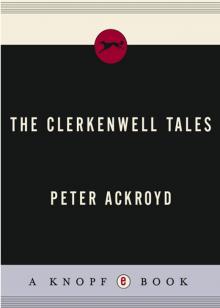 The Clerkenwell Tales
The Clerkenwell Tales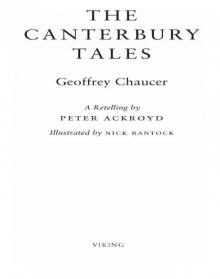 The Canterbury Tales
The Canterbury Tales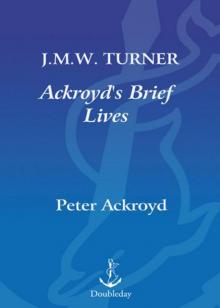 J. M. W. Turner
J. M. W. Turner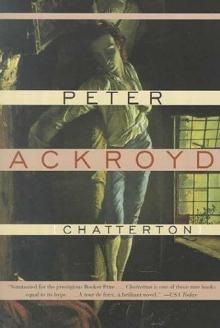 Chatterton
Chatterton The Canterbury Tales – A Retelling
The Canterbury Tales – A Retelling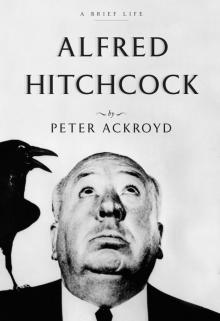 Alfred Hitchcock
Alfred Hitchcock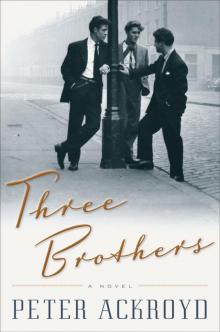 Three Brothers
Three Brothers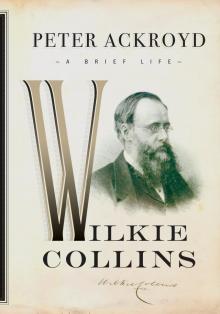 Wilkie Collins
Wilkie Collins Venice
Venice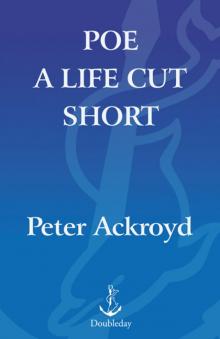 Poe
Poe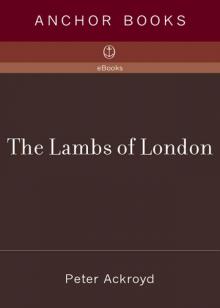 The Lambs of London
The Lambs of London London
London Queer City
Queer City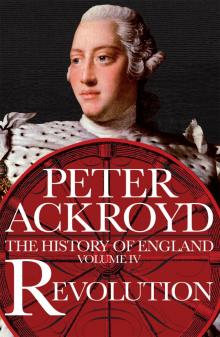 Revolution, a History of England, Volume 4
Revolution, a History of England, Volume 4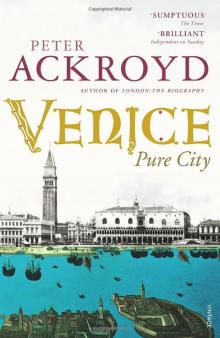 Venice: Pure City
Venice: Pure City Foundation
Foundation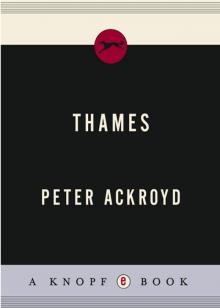 Thames
Thames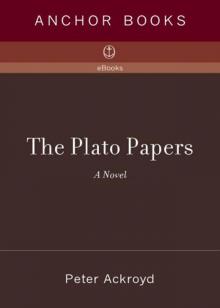 The Plato Papers
The Plato Papers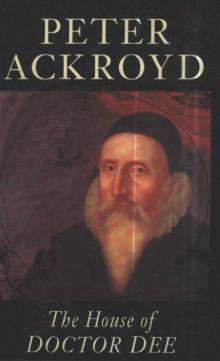 The house of Doctor Dee
The house of Doctor Dee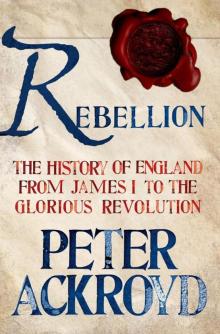 Rebellion: The History of England from James I to the Glorious Revolution
Rebellion: The History of England from James I to the Glorious Revolution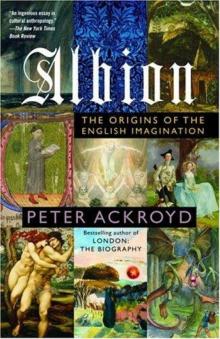 Albion: The Origins of the English Imagination
Albion: The Origins of the English Imagination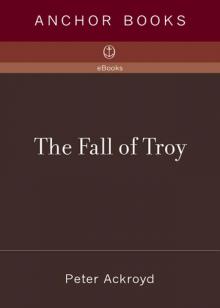 The Fall of Troy
The Fall of Troy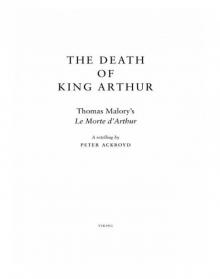 The Death of King Arthur
The Death of King Arthur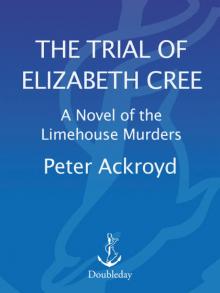 The Trial of Elizabeth Cree
The Trial of Elizabeth Cree London: The Biography
London: The Biography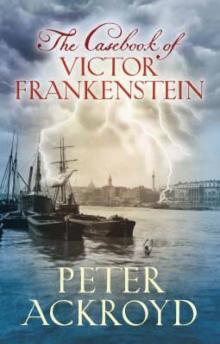 The Casebook of Victor Frankenstein
The Casebook of Victor Frankenstein Hawksmoor
Hawksmoor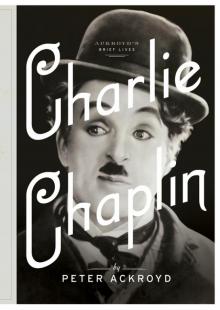 Charlie Chaplin
Charlie Chaplin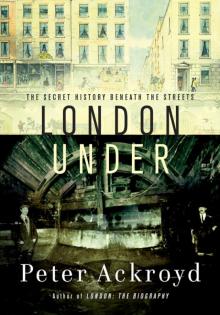 London Under
London Under